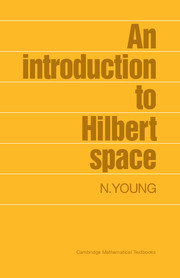Book contents
- Frontmatter
- Contents
- Foreword
- Introduction
- 1 Inner product spaces
- 2 Normed spaces
- 3 Hilbert and Banach spaces
- 4 Orthogonal expansions
- 5 Classical Fourier series
- 6 Dual spaces
- 7 Linear operators
- 8 Compact operators
- 9 Sturm–Liouville systems
- 10 Green's functions
- 11 Eigenfunction expansions
- 12 Positive operators and contractions
- 13 Hardy spaces
- 14 Interlude: complex analysis and operators in engineering
- 15 Approximation by analytic functions
- 16 Approximation by meromorphic functions
- Appendix: square roots of positive operators
- References
- Answers to selected problems
- Afterword
- Index of notation
- Subject index
- Frontmatter
- Contents
- Foreword
- Introduction
- 1 Inner product spaces
- 2 Normed spaces
- 3 Hilbert and Banach spaces
- 4 Orthogonal expansions
- 5 Classical Fourier series
- 6 Dual spaces
- 7 Linear operators
- 8 Compact operators
- 9 Sturm–Liouville systems
- 10 Green's functions
- 11 Eigenfunction expansions
- 12 Positive operators and contractions
- 13 Hardy spaces
- 14 Interlude: complex analysis and operators in engineering
- 15 Approximation by analytic functions
- 16 Approximation by meromorphic functions
- Appendix: square roots of positive operators
- References
- Answers to selected problems
- Afterword
- Index of notation
- Subject index
Summary
After Newton's success in giving a mathematical account of planetary motion, scientists were emboldened to attempt the description of many physical phenomena using the differential calculus. The ‘infinitesimal’ viewpoint gave a fruitful way of formulating laws governing everyday processes or their idealizations. Wave motion, fluid flow and the conduction of heat were analysed. Their description is harder than that of celestial motions, if only because the world of our experience has such an abundance of detail in comparison with the emptiness of space. Still, there is a miraculous feature of the fabric of the universe to hearten the mathematician: a great diversity of physical processes is well described by second-order linear partial differential equations. Much of functional analysis stems from the study of such equations.
Imagine that you are a pioneer of mathematical physics faced with a new class of equations of the general type Lf = g. Here g is supposed to be a known function of space and time variables, L is a linear differential operator and f is a function which is unknown but required to satisfy some initial or boundary conditions. Your first concern would be to devise a way of finding f. Even if you work out a bag of tricks that does well in practice, think of the difficulty of proving that a particular technique will always succeed for the class of equations under study.
Information
- Type
- Chapter
- Information
- An Introduction to Hilbert Space , pp. 67 - 88Publisher: Cambridge University PressPrint publication year: 1988
Accessibility standard: Unknown
Why this information is here
This section outlines the accessibility features of this content - including support for screen readers, full keyboard navigation and high-contrast display options. This may not be relevant for you.Accessibility Information
- 1
- Cited by
